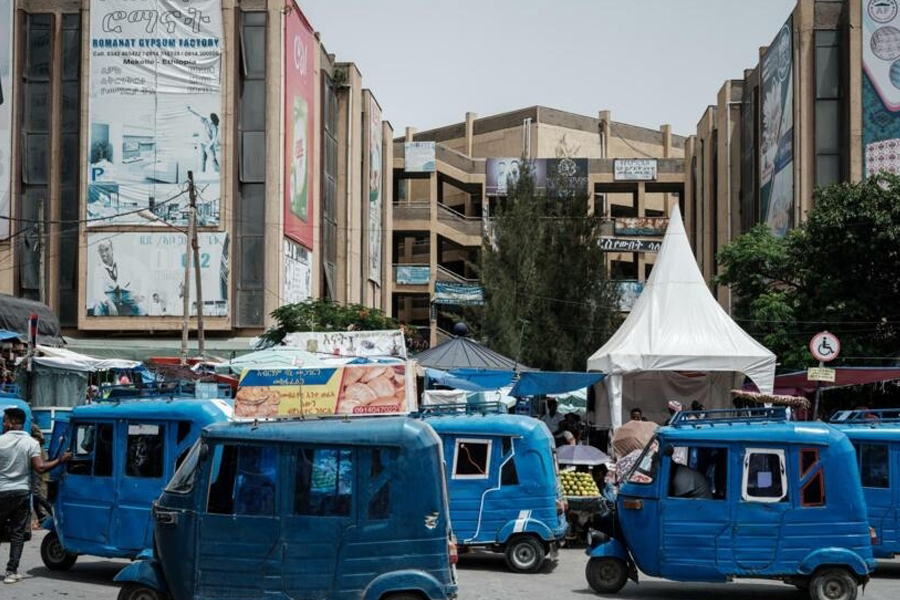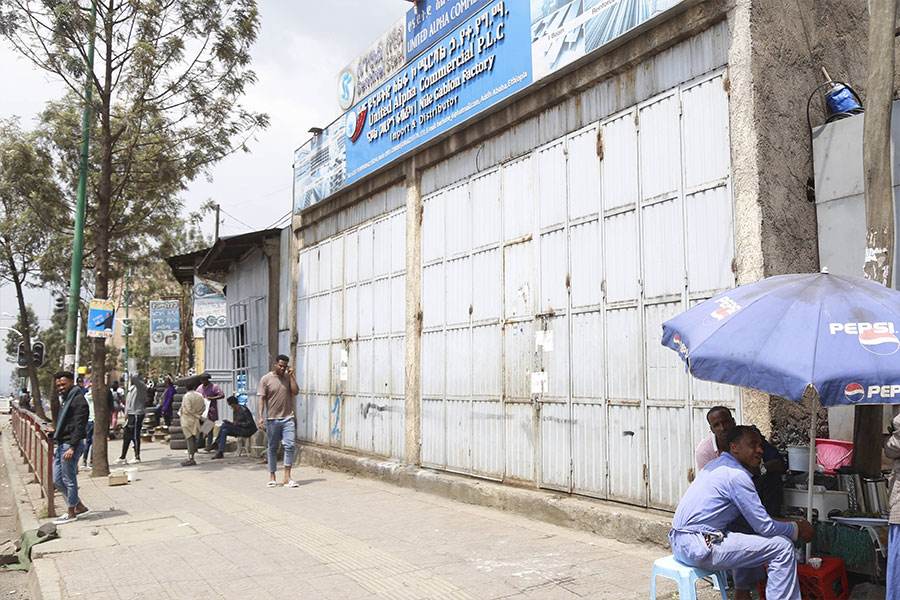
Fortune News | Jan 01,2023
The roads leading down to the United Nations Economic Commission for Africa (UN-ECA) compound, down Menelik II Avenue, are usually so packed with cars that finding a parking spot during the day is almost impossible.
"You couldn't find a spot to throw a pebble," says Mame Kassa, a parking attendant who has been working the block for a year and a half.
Mame, along with seven other members of his association, used to earn about 1,500 Br a day working as parking attendants. Lately, however, they only receive 150 Br on a good day. The parking spots are now mostly empty with a couple of cars parked here and there.
"I'm glad we're still working though, it gives me peace of mind," he says, standing next to a small mobile shop next to the road, while one of his workmates, Abel Solomon, bicycles around the block.
Mame is just one of the estimated 40pc of all workers in the country that are self-employed. A significant amount of the self-employed, surviving at subsistence levels, are engaged in the wholesale, retail, tourism, transportation or warehouse sectors.
During the Novel Coronavirus (COVID-19) pandemic, demand has declined by 80pc, leaving the likes of Mame in a very precarious situation. The drop has been caused by the fact that most of the services under these sectors are heavily reliant on the daily activities of the public.
Prior to the government's state of emergency declaration, the COVID-19 Ministerial Committee had banned bars and restaurants from operating temporarily to prevent and contain the spread of the virus on March 20, 2020.
But these days, providing alcoholic drinks or leisure activities at nightclubs and bars comes with a heavy penalty during the state of emergency.
Mame and his colleagues used to tend to a lot of cars even after the Western Branch of the Ministry of Revenues changed their location from a building across from the UN-ECA.
"There're a lot of hotels around here, so work was still good," he says. "People came to use different hotel facilities during the day, and we had a lot of customers coming to the bars and the clubs on the weekends. That has now stopped."
The impact of the containment measures being taken by the government, especially the social distancing measures, are already affecting all sectors. People are no longer out and about and, as a result, activities in the city have slowed to a crawl.
Lyra Abraham, an entrepreneur who recently joined the booming event planning business in Addis, has not been able to work for the past two months for this exact reason.
የአዲስ ፎርችን ሐልዮ-መንበርት፤ ከሚያዚያ 25፥ 2012 ለህትመት በበቃው አብይ ጉዳይ ላይ የጋዜጠኞቻችን እና የዐርታዒያን ዉይይት
Lines of shoeshine stalls devoid of customers line Mauritius Street in Addis Abeba.
“My income was entirely dependent on gathering people together,” she said.
Lyra started organising events 10 months ago and her efforts had just started paying off when COVID-19 took the world by storm. Her monthly music-based events were just getting traction, and she had started communicating with sponsors after months of financing the events out of her own pocket and through mutually beneficial deals struck with venue owners.
“I took a big chance when I ventured into this business, but it was important to me that I follow my passion," she said. "I had to work on my brand to get people to come. But it started off well, and I had bigger plans before this all happened.”
Organising events is now impossible. Planning for the future for all businesses is difficult, because there is no clear date on when things will go back to normal.
On average, estimates show that if the current situation continues close to 1.9 million self-employed people in urban areas may end up losing their jobs.
The self-employed are expected to lose 256 million dollars in the coming three months, according to a preliminary study done by the Jobs Creation Commission. Needless to say, this will have reverberating effects on their families.
Mame, for instance, is the sole breadwinner for his family. He lives with his partner and their two-year-old daughter. The family lives in a rented room in a compound with two other tenants, paying 1,500 Br a month.
"That's her," he says proudly, flipping through the multiple pictures he has taken of his daughter.
"I haven't paid rent in the last two months," Mame says. "I'm just covering our daily costs, like food and other necessary material for now. I'm hopeful that things will get better soon, and we'll be back to full-time work."
Lucky for Mame, new laws during the state of emergency forbid landlords of residential or commercial houses from evicting their tenants or increasing their rent. Eventually though, payment will need to be made for those who have been unable to afford their rent during the crisis.
“The best support right now would be to alleviate some of our expenses,” said Lyra, who pays 10,000 Br a month for rent. If she could cut that amount down, she would use the money for other expenses.
"If not, then the piled up sum will still be waiting for me when things are back to normal,” she said.
The drastic decrease in demand for accommodations, food and personal services is taking the strongest hit, which is expected to result in job and income losses. These economic losses may put those living at a subsistence level below the poverty line.
Entrepreneurial spirit aside, self-employment in Ethiopia is strongly linked with low levels of education and wages, with most people having no financial cushion to fall back on in times like these.
A large number of Ethiopians who are self-employed are engaged in medium to low-skill occupations. Construction work, for instance, is one sector with a huge proportion of temporary and unskilled workers.
Mame, a man of many hats, used to be a construction worker. His long list of forays includes being a ceramics layer as well as an assistant in a hair salon before venturing into his current job. He says being a parking attendant is the best choice for him, since he gets to be his own boss.
Working in construction was risky, according to him.
"We were working on 15-story buildings with no safety precautions, and I got this scar from an electric shock one time," he says, pointing to a healed but marked wound on his finger.
"The pay is also disproportionate to the work you do," he adds. However, even this seemingly unfair job is about to be taken away from many.
Construction, yet another sector expected to be hit hard by this crisis, will have an estimated 741,000 jobs threatened over the next three months.
Due to problems with financial liquidity, nearly 60pc of all construction work is expected to come to a halt, putting construction workers, mostly daily labourers, first in line to lose their jobs.
The Ministry of Labor & Social Affairs is currently addressing 55pc of the overall population that is considered to be in need of the Productive Safety Net Programme. It has requested a plan and a parallel budget from the Office of the Prime Minister to include the remaining 45pc for a duration of three months, which are pending approval.
Among the solutions proposed by the Jobs Creation Commission, one is widening the Productive Safety Net Programme implemented by the Labor Ministry. Widening the Programme that has over 1.3 million beneficiaries to accommodate more people to receive direct cash to support themselves and their households during this time will require 134 million dollars for the coming three months.
MoLSA is also currently underway in redirecting the previous budget allocated for its core six directories, money that was previously destined for training and other programmes that will not be taking place, according to Dereje Taye, public relations and communications director at the Ministry.
These measures are in addition to providing access to zero-interest credit and loan guarantee schemes recommended by the preliminary assessment carried out by the Jobs Creation Commission.
The loan guarantee scheme is important, since businesses will already have been struggling and some have defaulted on loans, according to Ewenetu Feleke, manager of delivery assurance & capability building at the Jobs Creation Commission.
"This scheme is a way to qualify them not only for the loans but to provide them with the support so that they are able to pay them back," Ewenetu said. "This is along with providing credit at a zero interest rate."
The Council of Ministers, in a set of economic measures to save lives and livelihoods, has, among other moves, instructed the Development Bank of Ethiopia (DBE) to set up a special window to facilitate the distribution of loans to medium and small-scale enterprises, according to Eyob Tekalign (PhD), state minister for Finance.
“The Council has also decided that the central bank should provide additional liquidity to microfinance institutions so they can avail credit to borrowers,” Eyob said.
There are clear economic implications, but the international response to COVID-19 will be more at a macro-level, in the form of debt relief which is supposed to be channelled to government budgets as credit, according to Boris Houenou, (PhD), an economist and data scientist at ViaSat Inc, headquartered in California.
"Decisions as to where and how this credit will benefit the informal sector or small businesses is a policy question that needs to be addressed," Boris said. "If clear and fine-tuned strategies are not implemented, it will leave out informal workers and small businesses."
There is no silver bullet solution, but cash transfers, loans, products or vouchers for food or necessities will likely reach some of the vulnerable people, according to him.
"Lockdown is a luxury that African countries cannot afford," he said. "I advocate for early universal mask use, which will allow economic activity to continue for people who live on a meal a day."
Mame and his workmates are not wearing masks or gloves for now. When asked if he is following health guidelines to stay safe from the virus, he says not to worry.
"Rest assured that both my hands and pockets have been washed clean because of COVID-19," he says, as Abel does another round on the block with his bicycle.
PUBLISHED ON
May 02,2020 [ VOL
21 , NO
1044]

Fortune News | Jan 01,2023

Sunday with Eden | Sep 07,2019

Sunday with Eden | Jul 26,2025

Viewpoints | Nov 12,2022

My Opinion | May 03,2025

Verbatim | Feb 17,2024

Advertorials | May 27,2024

Fortune News | Sep 01,2024

Agenda | Oct 09,2021

Radar | Jun 14,2020

Dec 22 , 2024 . By TIZITA SHEWAFERAW
Charged with transforming colossal state-owned enterprises into modern and competitiv...

Aug 18 , 2024 . By AKSAH ITALO
Although predictable Yonas Zerihun's job in the ride-hailing service is not immune to...

Jul 28 , 2024 . By TIZITA SHEWAFERAW
Unhabitual, perhaps too many, Samuel Gebreyohannes, 38, used to occasionally enjoy a couple of beers at breakfast. However, he recently swit...

Jul 13 , 2024 . By AKSAH ITALO
Investors who rely on tractors, trucks, and field vehicles for commuting, transporting commodities, and f...

Oct 11 , 2025
Ladislas Farago, a roving Associated Press (AP) correspondent, arrived in Ethiopia in...

Oct 4 , 2025
Eyob Tekalegn (PhD) had been in the Governor's chair for only weeks when, on Septembe...

Sep 27 , 2025
Four years into an experiment with “shock therapy” in education, the national moo...

Sep 20 , 2025
Getachew Reda's return to the national stage was always going to stir attention. Once...